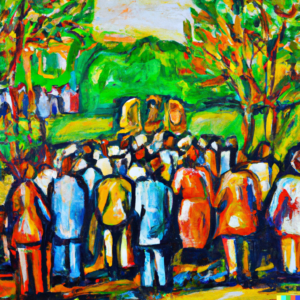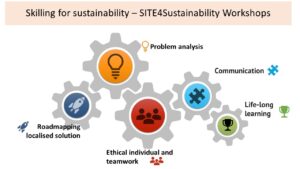Tailored to: Companies, national and international organisations, government institutions and NGOs
Training company staff, municipality or village council teams, NGO teams and citizens in community engagement
 Work shops – Interactive – Live – Action Oriented
Work shops – Interactive – Live – Action Oriented
1 day – 3 days – project based interactions
Education for sustainable development (ESD) is based on the idea that sustainable development requires social learning at the community level. For workers and citizens to become engaged in local development, they must understand the implications of non-sustainable growth and develop the right attitudes of accountability as well as problem solving skills.
Presently, companies are being called to train their staff to become sustainability champions. Similarly, other public and social sector organisations are being requested to train youth and citizens for attitudinal change and civic behaviour.
To respond to such demands, SITE4Sustainability has developed a unique programme, wherein participants learn to apply basic sustainability frameworks to address a local problem in the community collectively. In our workshops, participants will also learn to apply design thinking to arrive at a shared vision for a solution design. They will identify the relevant stakeholders, analyse their social responsibilities and determine the costs and viability of cooperation and coordination. The SITE4Sustainability team will then guide teams to propose possible solution designs to address the chosen problem and implement a solution whenever possible, followed by an impact evaluation.
Our workshops will help participants to understand and develop practical skills for collective thinking and collective action. Each workshop is aimed to result in a positive transformation of the participants and their community or organisational environment.
Five main learning outcomes will be emphasized.

Problem analysis: Identify, formulate, review research literature, and analyze complex problems reaching substantiated conclusions using critical thinking and the SITE4Sustainability frameworks.
Roadmapping localised solutions: Design solutions for complex problems that meet the specified needs with appropriate consideration for the public health and safety, as well as cultural, societal, and environmental considerations. Apply reasoning informed by the contextual knowledge to assess societal, health, safety, legal and cultural issues and the expected consequences as well as possible negative repercussions.
Ethical individual and team work: Apply ethical principles and commit to professional ethics and responsibilities to function effectively as an individual, and as a member or leader while interacting with other societal stakeholders.
Communication: Communicate effectively with team members, SITE4Sustainability team and society at large, writing effective reports and design documentation, make engaging presentations, and give and receive clear instructions/critiques.
Life-long learning: Recognize the need for, and have the preparation and ability to engage in independent and life-long learning in the broadest context of societal, environmental and technological change.
Our workshops will help participants understand and develop practical skills for collective thinking and collective solution design. Our goal is to make all efficient co-designers of tomorrow’s sustainable society. Participants will experience peer-to-peer learning, action learning, service and project based learning. They will be challenged to apply their knowledge to address a problem applying action-research methodology under the guidance of the SITE4Sustainability team.
